
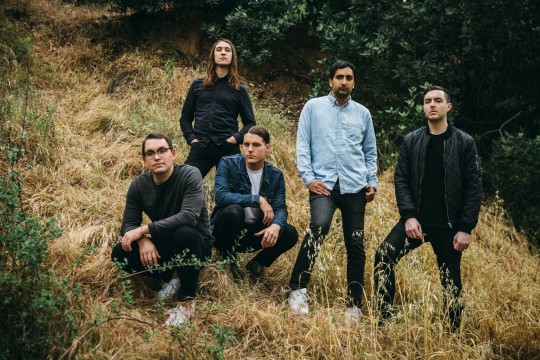
Loud Love : A Day In LA With Deafheaven
The California screamers open up about real life, baby ducks, and ‘Ordinary Corrupt Human Love’
Full article by Larry Fitzmaurice via Stereogum
Everyone has to grow up eventually — even ducklings. “Look, dude — the baby ducklings!” Deafheaven guitarist Kerry McCoy stops as we’re mid-conversation, pointing out a plump of web-footed friends on a small rolling pitch alongside the walking path of Los Angeles’ Echo Park.
“I know! They’re getting big,” the band’s howling lead singer George Clarke marvels, as the two stop to briefly ponder the not-quite-grown, no-longer-young fowl squatting and waddling on the grass.
“I saw them the other day, too,” says McCoy.
“They were more yellow before,” Clarke explains with a level of attentiveness that would make one think he raised the ducklings himself.
I’m here to observe what Clarke describes to me as “what a normal day for us is like,” as Deafheaven luxuriate in the relative calm before the busyness of touring and promo that will accompany the release of their fourth album, Ordinary Corrupt Human Love (out July 13 via ANTI-). These days, Clarke and McCoy are sticklers for routine — and as they recount their regular goings-on to me, it’s slightly adorable that these longtime friends’ day-to-day approach bears close similarity: wake up around 7 in the morning, hit the gym, run some errands, meet up in the park for a bit, and watch a movie or an episode of Billions before crashing out. Both spend part of their day caring for others: Clarke for his grandfather who currently lives with him, and McCoy for a few persistently hungry cats. “I have to stay out until 6 or 7 PM, otherwise they meow until they get food,” he mock-complains with a grin.
Earlier in the day, Clarke and I hit up the Echo Lake outpost of crunchy Cali natural-food chain Lessen’s, as he dumps a variety of salad-bar ingredients — corn, beets, kale, shredded cabbage and peppers, and a heaping helping of steamed veggies, if you’re looking to take on the Deafheaven Diet — into a container. We walk over to the sprawling Echo Park and Clarke unfurls a sizable blanket, festooned with the album art for the band’s 2013 star-making LP Sunbather, before stripping to a white tank-top and laying out belly-down to nosh while we chat about the latest mixtape from Oakland rapper All Black. McCoy joins us soon after along with former member Stephen Clark, who stoically sips from a bottle of water and sucks down a few cigs while the trio are quite literally sunbathing under the LA rays.
All it takes is one listen to Ordinary Corrupt Human Love to deduct that this period of respite is well-earned. Since their alluring 2011 debut Roads To Judah, the band’s dark-arts alchemy of death metal’s frigid rush, shoegaze’s impressionistic swarm, and the emotional catharsis of post-rock has somehow only grown more epic with every release. That’s even more true with their latest record, which at times recalls Mellon Collie-era Smashing Pumpkins and Sunny Day Real Estate’s Diary in its ultra-bright melodic sweep. There are female vocals present, courtesy of West Coast occult-rocker Chelsea Wolfe — as well as actual singing, as Clarke shows off a deeper vocal register beyond his signature burned-out bark.
The personal boundary-pushing and overall prettiness of Ordinary Corrupt Human Love doesn’t so much suggest a newer, shinier Deafheaven as it does a natural progression (or a full realization, even) of the genre-blending hard rock sound they’ve spent most of the decade refining. As tempting as it might be to refer to the album as Deafheaven’s “mature” turn, there’s still a youthful passion that courses through it like a lit match dropped into dry brush — but that doesn’t mean the quintet haven’t gone through some serious personal changes in the interim between 2015’s New Bermuda and now (which marks, to date, the longest gap between Deafheaven records).
“We were 24 when Sunbather came out,” Clarke reflects while discussing the intense emotions and personal strain the band’s been through since that record’s release. “We were still sleeping on floors when we were home, but the rest of the time we were on tour with idle hands and free cash.” He pauses for a second and chuckles ruefully. “Some people are smart — but we decided not to be.”
Before their current residence in LA (Clarke and McCoy have lived in the city for about four years now) and Deafheaven’s teeth-cutting Bay Area days, the pair spent their adolescence scrapping about in the central California suburbs of Modesto. “It was normal,” McCoy describes their respective upbringings, “but it’s all relative. I’m sure Bill Gates’ kids have seen some shit, too.” But he’s quick to note that the relative mundanity of their upbringing also made for a normalization of the intolerance the young punks experienced growing up, too: “I’d just accepted that the way the world went was seeing a giant truck with a Confederate flag drive by, calling me a fag.” (In the middle of this parkside recollection, Clarke interrupts to point out something decidedly not normal: a shirtless pedestrian sporting a full-chest Monster energy drink tattoo. “Check out how lit this tattoo is,” he giggles, as we briefly debate its authenticity.)
When he was 15, McCoy’s father took him to a protest against the Iraq War, and he wore a white armband to school afterwards, which resulted in him getting “destroyed” by his classmates. “We recently went to the March For Our Lives,” Clarke mentions, “and I think it’s really cool that kids these days — even if they’re not 100% informed on stuff — are really making an effort to be. Comparatively, there was no one [in high school] thinking about anything else other than the direct narrative you were given in this small town.”
Music had been in both of their lives from an early age — McCoy’s father once worked as a music journalist, and some of Clarke’s earliest memories include leafing through CD booklets with his mother — and the outsider feeling both of them shared only further deepened their sonic interests. “When you’re living in the Central Valley and you’re into ‘alternative’ things, it forces you further into the hole you’re digging for yourself,” Clarke explains. “You’re already a loser with acne, and now you’re painting your nails for a Misfits show,” McCoy follows up with a chuckle. His first band was a punky high school outfit called The Confused, which self-distributed a CD called What The Hell that everyone in his social circle thought “sucked.” Clarke’s inaugural musical foray was in a band called Fear And Faith Alike that, in his words, “was very 2002 metalcore.”
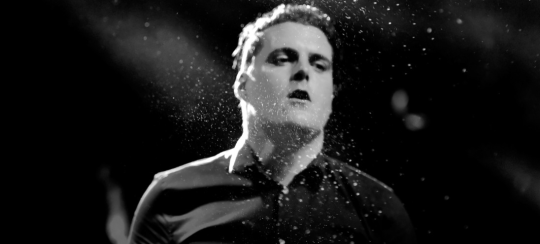
CREDIT: Frazer Harrison / Getty Images
Clarke and McCoy first became friends when the latter saw “this fool” (Clarke) sitting outside in the rain during high school, decked out in fishnet arm sleeves, a Slayer T-shirt, and a white backpack covered with pentagrams and band names scrawled in Bic. They stayed close as the former bounced around high schools, returning to Modesto after barely graduating in San Jose; after a few failed attempts at forming post-high school bands, the two formed Deafheaven in 2009 after McCoy joined Clarke to share a $500/month apartment in the Upper Haight area of San Francisco.
Deafheaven began as a pretty much anonymous project, to the point where the pair created a Facebook page for the band that essentially positioned it as a one-man act. “We didn’t tell anyone we grew up with about it,” Clarke explains. “We knew if we told people it was us, everyone would be like ‘Fuck off.'” In 2010, they recorded a demo with Bay Area producer Jack Shirley for the cost of $500, a sum which Clarke and McCoy (who were scrambling to even make monthly rent) struggled to pay back for six months.
“This man’s patience is endless,” Clarke speaks admirably about Shirley, whom McCoy refers to as “the Ian McKaye of the West Coast” and “like a straight-edge Marine”; he’s produced every Deafheaven record since. “They were broke beyond broke,” recalls Shirley, whose work with Deafheaven has led him to record acts like Wolves In The Throne Room and Jeff Rosenstock. “It wasn’t a huge deal, though. I try to be patient in those situations, and I’m glad I didn’t [let money get in the way], because it would’ve severed my ties with a band that I have a great relationship with now.”
After the demo made the rounds online, Deafheaven expanded to a full-band lineup and signed to Converge frontman Jacob Bannon’s Deathwish Inc. label, who released Roads To Judah and Sunbather — the latter of which received a profile-raising critical response that metal and “heavy” music in general typically doesn’t enjoy. “We went from a band that nobody really gave a fuck about, to … not the world’s biggest band, but a thing!” McCoy exclaims. “I had an apartment, I moved to LA, I got a girlfriend — life got kind of big.”
The success Deafheaven enjoyed following Sunbather’s release was, for a band on their level, a bit dizzying. Their fanbase spanned kindred spirits like Mono and Explosions In The Sky to rapper Danny Brown and Third Eye Blind’s Stephan Jenkins. On the other hand, the band found themselves unwittingly receiving the indie-TMZ treatment after a Swedish blogger spotted them hanging out at the VIP area of Gothenburg’s Way Out West festival with a Sub Pop representative (full disclosure: I was also present for said hang), ginning up a post shortly after speculating about the band’s potential next career moves — a surprise to the folks back at Deathwish. “I felt so bad,” Clarke says in a tone of sincerity about the accidental reveal.
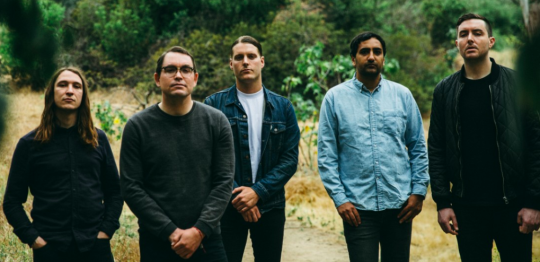
CREDIT: Gari Askew II / Stereogum
Combined with the extensive post-Sunbather touring schedule, the increased attention on Deafheaven — as well as the pressures of writing and recording the band’s next album, which they’d committed to within a tight time frame under new label home ANTI- — was starting to take its toll on everyone involved. “All this touring and great stuff was fun and exciting, but it blows up your personality with regards to things you have when you become middle-class,” McCoy states. “And you have habits that blow up with that.”
As work on New Bermuda progressed, the pressure of following up their big breakthrough began to wear on the band — hard. Shirley states that, as a “habitually sober” person, he didn’t witness any dysfunction in the recording studio; but McCoy describes the ways in which Deafheaven’s members dealt with the situation as “unhealthy,” and he and Clarke started to literally lose sleep over the prospect of what would come next. “I’d wake up in the middle of the night thinking that everyone was mad at me because the record sucked,” says McCoy, “and we’d all have to go back to Whole Foods — everyone was laughing at us.”
Various substances were on-hand and frequently present during this time — a product of bad habits never dropped and exacerbated by the party-hardy temporary lifestyle that touring afforded. “You’d be like, ‘Well, I gotta be in the practice space for five hours today — better bring two 40’s,'” Clarke remembers. “When you’re touring for five years, your body degrades,” explains guitarist Shiv Mehra, who joined the band along with drummer Daniel Tracy while Sunbather was being recorded. “Drinking doesn’t help.”
Clarke recalls a show in Sao Paulo on the band’s first South American tour supporting New Bermuda as a colliding point for the band’s substance use and personal strain. “It should’ve been insane,” he recalls with a touch of regret, “But everyone was backstage burnt that the booze wasn’t there yet.”
“We were all just sitting there staring at our phones, waiting for whoever — or whatever — to show up,” McCoy adds. “Our entire world wants to come backstage and be the guy to hang out with you, and they know there’s a certain way to do that.”
“We were all still bothered by each other from touring,” Clark, who possesses a quiet yet thoughtful demeanor, states. “We didn’t have any time off from each other for years.” Following New Bermuda’s tour cycle — a period of time he says “quite literally ruined his life” — he chose to leave the band and was replaced by current bassist Chris Johnson, but still remains close with everyone.
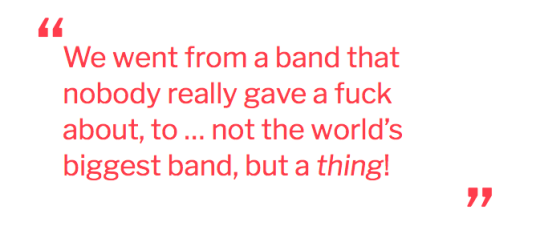
“I didn’t handle having money well,” Clark asserts with straightforward conviction. “It was so easy to party, and I was never much of a partier — so I was all over the world having fun, with no longevity in mind. It all came crashing down.”
“It was a dark and bad experience,” McCoy states plainly on the time period surrounding New Bermuda. By the end of the album cycle, everyone was exhausted, and the mere act of being in the band had turned into drudgery.
“It stopped being fun,” Clarke states on his view towards the band at that point. “It became a chore.”
I ask if there was ever a point during this period of time in which he thought Deafheaven would cease to exist. Later, when I relay his answer to others in the band, they’re quick to note it was an exaggeration, but it’s a rough reply regardless: “I kind of thought someone would die,” says Clarke. We’re not gonna break up because we don’t have anything else, but something drastic or scary happening was within the realm of possibility. If anything would’ve taken us down, it would’ve been … tragic.”
When I press on if there were any specific close calls that took place, the three demur, nervously laugh, and murmur to themselves, “Maybe — not really,” declining to elaborate. “When you’re fuckin’ around, you’re fuckin’ around,” Clarke says with an uneasy chuckle.
Clarke quickly follows up: “When you have a problem, you have a problem.”
Work on Ordinary Corrupt Human Love informally began in late 2016 around a single piano riff McCoy had been toying around with, but much of the album was written and recorded from October of last year until this past February. Deafheaven camped out in a cluster of Oakland homes and, after an informal jam session during the first day of recording, found that the time off did them good.
“We finally dealt with all the stuff that made New Bermuda so dark — and when we did, we realized that all that other stuff was junk,” McCoy passionately describes. “When we all got in a room together, I was like, ‘This was the juice of life right here.'”
“It was like we’d been holding our breath for three years, finally let it out, took another one, and said ‘Everything’s gonna be OK,'” Clarke adds.
In truth, there was still a ways to go. To this day, Deafheaven’s members describe themselves as living “healthier” than before, but McCoy is the only band member who’s completely sober, a decision he made during recording late last year after an extended struggle with drug addiction. It’s a sensitive topic for him to discuss, and the details he’s willing to offer regarding his path to sobriety are scant — but he makes it unmistakably clear that things could not go on the way they were for much longer.
“I’d come to a point where I was done being out there,” he explains, “And I was willing to try anything to get off it.” McCoy reached out to a friend, who helped put him on the path to recovery; he’s been sober since late 2017. “My favorite thing in the world was to play guitar,” he states, “And for a long time, I forgot that. Ever since I made this decision, my life has gotten immeasurably better.”
Casting aside the past was essential for not just McCoy, but the entirety of Deafheaven to move forwards after the fraught period of time they were trying to leave behind. “I don’t think anyone who worked on New Bermuda wanted to make another record that sounded like New Bermuda,” Clarke states, who goes on to describe Ordinary Corrupt Human Love as the sound of “people enjoying what they’re doing.” If the aesthetic of the new album reflects the emotions of the people who recorded it, then the lyrical content zooms in on the world around them — the splendor and sameness of peoples’ everyday lives.
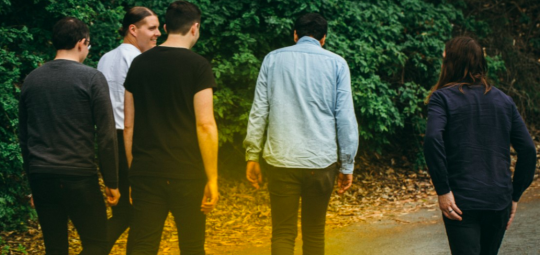
CREDIT: Gari Askew II / Stereogum
The universal, explicitly humanistic focus was developed after Clarke began collaborating with photographer Nick Steinhardt to, in his words, “photograph people in their natural habitat.” “I told him I didn’t want anything extraordinary — just people in their everyday routine, looking at a snapshot of someone in their day and just drinking it in,” he explains. The album’s cover features an anonymous woman in Los Angeles’ Civic Center area, her scarf blowing in front of her face; the inlay art features a child holding out his hand to his mother as he prepares to cross the street.
McCoy describes the album cover as “a potential alternate version” of the iconic album art for Radiohead’s The Bends, and Clarke cites the tinted-hue portraiture of Belle And Sebastian’s visual art as a parallel — both comparisons serving as reminders that, despite their roots in heavy music, their palettes span far beyond what genre purists might come to expect.
And if Deafheaven’s genre-agnostic approach seemed polarizing around the time of Sunbather, it seems weirdly prescient now. In a way, the 29-year-old McCoy and Clarke are indicative of the landscape-flattening streaming generation, in a good way. Sure, it’s easy to bemoan the age of the algorithm and the fluctuating state of discovery for budding music fans in the digital age. But it’s even easier to forget that discovering “good” music used to possess a distinct social element not far off from joining the football team in high school: Are the indie kids any different than the jocks if they still bristle at people joining their lunch table?
For Deafheaven’s and younger generations, discovering new music is easier than ever, and if you’re willing to turn discovery into creativity as they have been, the possibilities are endless. And anyway, even though Deafheaven’s earlier work was sometimes overshadowed by the band’s perpetual and ineffective battle with the metal scene, the band’s members have since learned to hang with the genre misconceptions. “My girlfriend sent me a screenshot about how ‘Honeycomb’ has a punk section — that’s textbook Oasis!” McCoy says with an easygoing laugh that speaks to a greater truth when it comes to getting older. Sometimes it’s easier to just let old grudges go.
Despite the cloudy forecast, it’s a bit brighter of a day than we’re expecting. With the threat of sunburn fast approaching, we pack up the blanket, take a leisurely walk around the park, and head to the 826 Time Travel Mart. The Mart’s a funky Sunset Blvd. spot funded by the Dave Eggers-founded nonprofit 826, featuring arch, kitschy items ranging from giant dinosaur eggs to a powdered concoction called “robot milk” — but McCoy’s less invested in the temporally-out-of-whack wares on display than he is in the tutoring courses being offered in the next room of the nonprofit-funded space.
An employee explains the programs offered as McCoy listens intently, and when Clarke returns from grabbing a coffee nearby he does similarly. At first blush, the thoughtfulness and social investment that the pair show during my time with them might seem too fitting of a narrative for a band trying to straighten up and fly right — but such character traits often come with growing up, too.
“Nikki Sixx was 27 when shit got really bad and he tried to clean up for the first time,” Clarke points out as our time comes to a close, before McCoy has to go check on the cats and Clarke’s grandfather needs help getting his computer fixed. “We reached that age too. We want to take what we do seriously and have a career — and to eliminate the things that get in the way of that. If you don’t die at 27, you can do a lotof shit.”